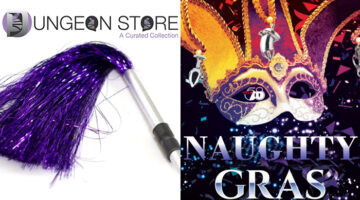By TheFunnyDom and Meet Kinksters
Meet Kinksters is empowering stronger relationships based on both sexual and romantic compatibility. No other dating app helps kinky people connect on all the things that matter. We’re proud to partner with leading voices in the kink & sex education space to help people explore their sexuality safely and confidently.
We asked TheFunnyDom, a leading online BDSM educator, for his thoughts on ways to identify healthy dominant partners when dating online.
In D/s (Dominant/submissive) relationships, it’s common to capitalize honorific titles, e.g. Dom(me) or Sir or Mistress. For the moment, we’re talking about dominants – lowercase “D,” because we’re not just giving away that title to anyone. It must be earned. Wherever you first met this candidate-Dom, the process of vetting is vital.
Do not doubt your right to do this. As a Daddy Dom I can tell you, a submissive who wants to vet me is someone I am very comfortable pursuing and considering as a potential partner.
If you’re currently speaking with a dominant type, keep a running tally of “red/green flags” as we explore these topics. If you’re new to power exchange, BDSM or dating in general, ask yourself how you’d want an ideal partner to answer.
Remember: Being a submissive doesn’t mean you must settle. Just the opposite! Submissives recognize and claim their strength through their choice to submit. Not everyone will earn your submission.
Meeting and vetting a quality Dom online presents a unique set of challenges. If you’re early on in the process, remember to take things slow. You’re under no obligation – and you shouldn’t! – choose to submit to someone after only a few quick conversations. Dig deep.
If you’re concerned about privacy early on, consider Meet Kinksters features such as blurring your photos until you choose to match with someone.
Does their communication reflect consent and respect for you?
It’s shocking how often a simple “Hello” seems too much for a ‘dom’ to manage. No matter if online or in person, they should speak to you politely, respectfully and plainly. There is no dynamic in place yet. Assuming one is a Big Red Flag. Have they addressed you with a name or title you haven’t agreed upon? Used honorifics without consent? Have they made any demand as to your behavior before you have consented to it? If yes, then that’s also a red flag. Someone who disregards your consent at the beginning of a relationship is not going to change.
What is their experience with D/s?
Experience itself does not validate a ‘dom’, nor does a lack of experience invalidate. What matters most is honest, clear communication. Are they upfront about their level of experience? If they’re new to kink, are they taking steps to educate themselves? What books are they reading, what podcasts are they listening to? Do they attend workshops?
If they say they have years of experience, what books, classes, events have they learnt from and why?
The right knowledge
This step involves discussing some key kinky topics with the prospective ‘dominant’. Everyone in a BDSM dynamic should have their own knowledge and comfort level with these important topics. If you do not, this is where you may need to do some more study yourself. Being a submissive doesn’t mean outsourcing everything to your partner; it’s important for you to have your own solid footing.
The more you learn, the more you can and should expect your partners to have put in that hard work too.
Gauge the dominant’s (and your own!) awareness and practise of the following:
- Power Exchange – Understanding where the power in D/s comes from. (It comes from the submissive!)
- Safety – Do they have an awareness of R.A.C.K. (Risk Aware Consensual Kink)? Do they approach potentially dangerous play like restraints, wax, knife play, breathplay with the necessary care and caution? Do they get regular STI checks? (Their reaction to discussing the issue of sexual health and mutual STI testing before play will help you judge if you can trust them.)
- Safewords – Do they have them, do they use them? What experiences do they have using them? Any glibness or dismissiveness on their part where safewords are concerned is an immediate Go No Further! This is not negotiable. No true and worthwhile Dominant minimizes the need for safewords.
- Aftercare – As with safewords, discuss their understanding of, and need for, compassionate aftercare. Aftercare is a vital and non-negotiable element of D/s. (Only the specific forms aftercare takes can be negotiated.)
Compatibility beyond D/s
This step is about matching their style of “D” for your kind of “s,” but also all the other dimensions of a healthy relationship. Are they monogamous or non-monogamous? Polyamorous? Are they partnered and ethically open? Just as important, what are you looking for? Be honest, with both yourself and this potential partner. Don’t feel pressure to accept a relationship style that doesn’t feel authentic to you, just because you’re compatible in other ways.
Many people who seek a D/s dynamic aren’t satisfied with having it confined to the bedroom. Relationships with a power-exchange component run the spectrum from something you do once in a while to a full-time “24/7” dynamic, and everything in between. You or your partner may desire to be dominant sometimes, and submissive in others. (A “switch.”) All of this is fine! What’s not okay is to avoid talking about these topics openly and honestly.
In terms of D/s compatibility, think about your particular flavor of submission. If you are a little or have strong babygirl leanings, you may ideally be suited to a Daddy/Mommy type more than a Master/Mistress. Keep in mind that these types overlap quite a bit. Look out for mismatching kinks, i.e if you’re not a masochist and they’re a sadist, will that be satisfied in another way? If you’re a rope bunny and really want to play with rope, are they a rigger or working towards some skill with rope?
Beyond all this fun sexy stuff, consider your broader compatibility. If you’re looking for a kinky life partner, are you aligned on topics such as substance use, the decision to have kids, hobbies, how to spend quality time, and more? Meet Kinksters is the only online dating platform where you can filter partners by BDSM roles and kinks but also these important lifestyle choices.
Compromises can be made but be honest with what you want and need. For the purposes of this guide, more than several incompatibilities constitute a red flag.
Check their References
This is one of the best ways to filter out fakes and spot a potential legitimate partner. Ask your prospective ‘dominant’ to connect you with a past or current submissive they have played with, ideally in a past ongoing/current capacity. This may seem like a lot to ask but trust me, it absolutely isn’t and any practicing, ethical Dominant will have multiple potential connections they can connect you with for a reassuring chat. If the prospective ‘dominant’ can not supply a reference partner due to being new to D/s, that is acceptable as long as they’re honest about it and are otherwise educated & aware. However, if when asked to do this, the ‘dominant’ responds in any negative way, this is a Red flag.
On Meet Kinksters, premium users can verify their identity with a government-issued ID. In the US, they’ll also check that name against public sex-offender registries. While nothing can 100% ensure safety, don’t be afraid to ask a potential dom to take these extra steps to help you feel comfortable.
So, how did they do? If they earned 5 green flags, they have earned that ‘D’ and you have found a prospective Dominant. If not, I would strongly recommend you move on and keep looking for a worthwhile and compatible partner. And if you haven’t tried it yet, give Meet Kinksters a go, the more real kinksters use our own dating app, the easier it will get to connect with one another.
Photo credit: Photo 132830744 © Volodymyr Tverdokhlib | Dreamstime.com










